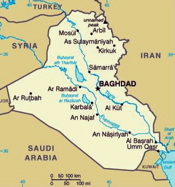Kevin Drum’s got a smart post on the likelihood of President Bush and Iraqi PM Nouri Maliki reaching a deal on a status of forces agreement that was recently believed to be dead in the water. Here’s the key quote from the WSJ article Kevin flags: Mowaffak al-Rubaie, Iraq’s national-security adviser, said the recent agreement between Washington and Baghdad on a withdrawal time horizon is pushing the talks along. “That mutual understanding has been very beneficial,” he said. “Neither of us can deal with open-ended uncertainty.” The Iraqis are still pushing for a 2010 date, in line with Barack Obama’s […]
Iraq Archive
Free Newsletter

Earlier this month, the Philippine government hinted that its four-year ban on Filipinos working in Iraq might be lifted before the year is up. In a July 15 statement, Assistant Foreign Secretary for Middle East and African Affairs Jesus Yabes cited the improving conditions in Baghdad as a reason to end the prohibition. The ban was put in place in 2004 by Philippine President Gloria Macapagal Arroyo following the abduction of a Filipino truck driver who was working in Iraq at the time. Yabes’ statement came just a month after a Filipino was killed and two others injured in a […]
I’ve been trying to put the weekend’s string of horrible terrorist attacks out of India, Turkey and Iraq into some sort of context, and Daniel Larison’s insightful post on the question of time-based vs. conditions-based withdrawal from Iraq is a good place to start: Meanwhile, the horrific attacks in Baghdad and Kirkuk offer a reminder why so-called “conditions-based” withdrawals are forever subject to revision and why timetables that can be revised by such contingencies are meaningless. Tying withdrawal to conditions in Iraq places U.S. policy at the mercy of the worst elements in Iraq, which gives these elements every incentive […]
Yesterday Marc Lynch over at Abu Aardvark advised us to “keep an eye on those kurds” (sic), who walked out on the Iraqi parliament’s vote on the provincial elections law to protest the provisions dealing with the status of Kirkuk, and the use of a secret ballot to pass them. Today comes news that the Iraqi presidential council, headed by President Jalal Talabani (himself a Kurd) but joined by Shiite Vice-President Adel Abdul-Mahdi, vetoed the law, sending it back to parliament for reworking (via today’s WPR Media Roundup). That effectively rules out any elections before next year, dealing a setback […]
The buzz over the weekend was about a Der Spiegel interview with Nouri Maliki in which the Iraqi PM essentially embraced the 16-month timeline for withdrawal articulated by Barack Obama. While Iraqi government spokesmen have since backpedaled on the remarks, there’s little room for doubt when you actually read them. It’s a testament to how opaque and unpredictable the political context of the Iraq War now is that President Bush, Maliki and Obama are all converging on the need for some sort of “timeframe” for withdrawal, even if everyone is hedging their bets by using murky language or tying it […]

It isn’t shocking that, all else being equal, Iraqi Prime Minister Nouri al-Maliki would prefer to have American troops out of his country. But all else isn’t equal. After Maliki caused a stir last week by calling for a timetable for the withdrawal of American troops, other members of his government immediately began qualifying the statement. The ambivalence is understandable; it reflects the ambivalence of Iraqis in general. Most are deeply suspicious of American motives and want U.S. troops out of their country. At the same time, in towns across Iraq and neighborhoods around Baghdad, U.S. soldiers and Marines are […]
Thinking out loud a bit about the news out of Iraq, what’s interesting is how the Iraqi government, by preempting the call for American troop withdrawals, has essentially appropriated what was originally formulated as an American leverage point (conditional disengagement) and used it against us. The political calculation in Baghdad is that we now need Iraq more than Iraq needs us. But what makes it impossible to really assess the significance of the development, besides the fact that it has yet to be put into ink, is that the political calculation will ultimately depend on the domestic security calculation, and […]

BAGHDAD — In a recent investigative hearing at the Central Criminal Court of Iraq (CCCI) in Baghdad, a detainee held by the U.S.-led Multi-National Force-Iraq (MNF-I) gave his version of the events leading up to his detention in a village in al-Anbar province, and his subsequent transfer to the Iraqi court for possible prosecution. The detainee, clad in a standard-issue bright yellow jumpsuit, explained that the weapons caches found on and next to his property were part of an elaborate set-up arising out of a feud with a neighboring family. According to the detainee, he was not involved in insurgent […]
What to think about the possibility of Iraq demanding that a troop withdrawal timetable be attached to the Status of Forces Agreement currently being negotiated? Kevin Drum has the relevant links and caveats here. I’d simply add that an Iraqi request for a withdrawal timetable presents a useful thought experiment: By removing the moral obligation to prevent the country from descending even further into a bloody civil war, it forces advocates for a continued engagement to do some soul-searching. If an unstable Iraq is as serious a threat to American national security as they maintain, then the logical conclusion is […]
